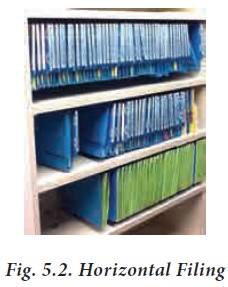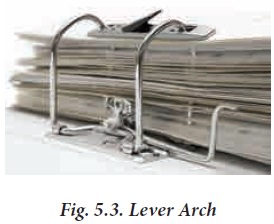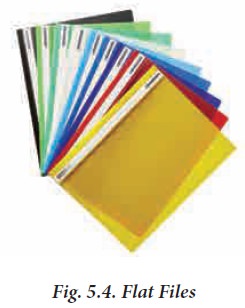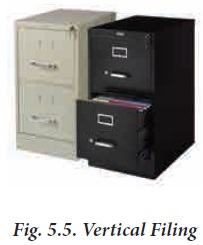Office Filing and Indexing - Types of Filing | 11th Office Management and Secretaryship : Chapter 5 : Filing and Indexing
Chapter: 11th Office Management and Secretaryship : Chapter 5 : Filing and Indexing
Types of Filing
Types
of Filing:
The
important types or methods of modern filing are:
1. Horizontal or Flat Filing:
Under this method the documents or
letters are placed in a horizontal or flat position one on the top of another
in order of date and the latest is on the top. The letters are filed along with
their replies. These files come in a variety of folders. More important of
horizontal files are discussed below:

i. Lever Arch Files: It
is a very popular type of horizontal
file. It can be described as a strong card-board folder which contains strong
metal arches which can be opened with the help of a lever. Records to be filed
are punched with two holes with the help of the punching machine either at the
top or on the left hand side of the forms, and are then files on the metal
uprights, after the arch has been opened by the lever. The arch lever file
facilitates alphabetical division which is done by inserting thick cards at
suitable places. The great advantage of this file is that papers can be
inserted or taken out with great ease without disturbing the order of other
papers in the file. The file also offers the advantage of proper preservation
of papers free from mutilation and dust, if the files are stored properly in
the almirahs.

ii. Flat Files: The “files” (or covers) are made of cardboard or thick paper. A
separate cover is allotted to each subject or customer, which contains all the
relevant correspondence and documents in this file. The received letters and
invoices posted and other relevant documents get filed in the chronological
order where a letter or a document needs to be filed at more than one place,
the necessary number of copies is made and filed in each relevant file. The
flat file has metal hinges which are inserted into the holes punched by the
punching machine.
The
prepared files are stored in almirahs and placed on top of each other. They are
also stored in drawers.

Advantages of Horizontal Filing:
1.
It
is a simple method to operate.
2.
It
is a cheap method to install.
3.
The
papers are kept in order in which they have been filed.
4.
Speedy
reference can be made to papers without removing them.
5.
The
contents are kept clear and dust free, especially where good covers and
almirahs are used.
Drawbacks of Horizontal Filing:
1.
Papers
cannot be taken out without dislocating other papers because the latest
document is on top where a flat file is used.
2.
Where
a file has become bulky, location of papers become very difficult.
3.
It
is suitable for offices where transactions are not many.
4.
This
method does not allow for expansion behind a certain point.
5.
It
requires an index to find out the concerned file.
2. Vertical Filing:
This
method of filing can be said to be the most modern. It is so named because the
contents are kept in an upright or standing position. This method of filing is
the result of the growing needs of business organization. The greatest drawback
of the horizontal filing is the time consumed in locating a paper or document.
As the business expands, the bulk of papers increases and location of a paper
becomes difficult and time consuming activity, vertical filing eliminates this
drawback of horizontal filing. Hence it has become a very popular method of
filing in large offices where number of subjects is large.

Advantages of Vertical Filing:
Vertical
filing offers many advantages over horizontal filing, which are summarized
below:
1. Economical: Vertical filing is more economical on account of two reasons.
·
The
folders are cheap, and
·
Many
folders can be accommodated by a single filing cabinet.
Hence
there is saving in terms of money as well as space.
2. Ready Reference: Any paper can be traced without wasting time. This is possible because there is a
separate folder for each customer or subject and its contents are easily known
due to description given on the tab or projected part of the back sheet.
Besides, any paper can be inserted and taken out with great ease in a short
time.
3. Elasticity: Filing cabinets provide
ample scope for expansion of filing facility. A single
drawer can accommodate a large number of folders. As the number of folders
increases the same drawer can be accommodate more folders upto some extent.
4. Safety and
Security: Greater
safety is another feature of this method of filing.
Papers do not get torn or gather dust since they are well- protected by
manilafolders kept safety in drawers, which can also be locked to provide
security to confidential documents.
5. Universal
Application: Vertical filing has proved useful
in preserving all types of papers, documents and memorandum. Orders, invoices,
letters, quotations, tenders, government circulars, etc., can be filed with
great ease and preserved without difficulty.
6. Adaptability: Vertical filing can be
easily adapted to all types of classification. The
folders can be arranged alphabetically, numerically, geographically,
subject-wise or on some other basis according to the needs of an individual
office.
Related Topics